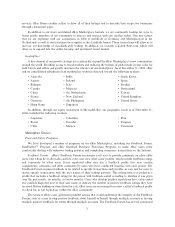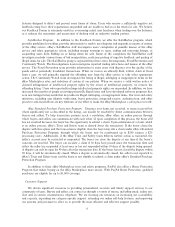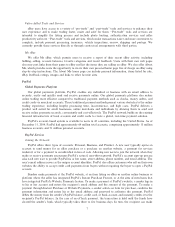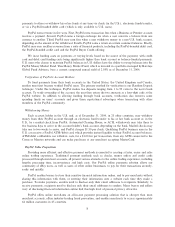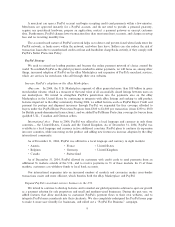eBay 2004 Annual Report Download - page 17
Download and view the complete annual report
Please find page 17 of the 2004 eBay annual report below. You can navigate through the pages in the report by either clicking on the pages listed below, or by using the keyword search tool below to find specific information within the annual report.invalidating the patent related to online auction technology and rendering it unenforceable. This ruling left only
two patents in the case. Trial of the matter began in April 2003. In May 2003, the jury returned a verdict finding
that eBay had willfully infringed one and Half.com had willfully infringed both of the patents in the suit,
awarding $35.0 million in compensatory damages. Both parties filed post-trial motions, and in August 2003, the
court entered judgment for MercExchange in the amount of $29.5 million, plus pre-judgment interest and post-
judgment interest in an amount to be determined, while denying MercExchange's request for an injunction and
attorneys' fees. We appealed the verdict and judgment in favor of MercExchange and MercExchange filed a
cross-appeal of the granting in part of our summary judgment motion and the denial of its request for an
injunction and attorneys' fees. Oral arguments for the appeals were heard on October 5, 2004. The U.S. Patent
and Trademark Office recently granted our request that it reexamine the three patents at suit, and on
January 26, 2005, the Patent and Trademark Office issued a ruling rejecting all of MercExchange's claims under
the patent that related to online auctions. We continue to believe that the verdict against us in the trial was
incorrect and intend to continue to pursue our appeal and defend ourselves vigorously. However, even if
successful, our appeal of and defense against this action will continue to be costly. In addition, as a precautionary
measure, we have modified certain functionality of our websites and business practices in a manner which we
believe makes them not infringe the two patents that we were found to have infringed. Nonetheless, if we are not
successful in appealing the court's ruling, we might be forced to pay significant additional damages and licensing
fees or modify our business practices in an adverse manner. We recorded an operating charge in the amount of
$30.0 million, reflecting the $29.5 million judgment, together with our estimate for pre-judgment interest of
$0.5 million. The charge and the related estimated tax benefit of $12.1 million were reflected in our consolidated
statement of income as patent litigation expense in the year ended December 31, 2003.
In August 2002, Charles E. Hill & Associates, Inc. Ñled a lawsuit in the U.S. District Court for the
Eastern District of Texas (No. 2:02-CV-186) alleging that we and 17 other companies, primarily large
retailers, infringed three patents owned by Hill generally relating to electronic catalog systems and methods for
transmitting and updating data at a remote computer. The suit seeks an injunction against continuing
infringement, unspeciÑed damages, including treble damages for willful infringement, and interest, costs,
expenses, and fees. In January 2003, the case was transferred to the U.S. District Court for the Southern
District of Indiana. After pending in Indiana for almost a year, the case was transferred back to the
U.S. District Court for the Eastern District of Texas in December 2003. A scheduling conference was held in
November 2004 and a preliminary trial date has been set for February 2006. The case is currently in fact
discovery and claim construction discovery. We believe that we have meritorious defenses and intend to
defend ourselves vigorously.
In February 2002, PayPal was sued in California state court (No. CV-805433) in a purported class action
alleging that its restriction of customer accounts and failure to promptly unrestrict legitimate accounts violates
California state consumer protection laws and is an unfair business practice and a breach of PayPal's User
Agreement. This action was re-filed with a different named plaintiff in June 2002 (No. CV-808441), and a
similar action was also filed in the U.S. District Court for the Northern District of California in June 2002
(No. C-02-2777). In March 2002, PayPal was sued in the U.S. District Court for the Northern District of
California (No. C-02-1227) in a purported class action alleging that its restrictions of customer accounts and
failure to promptly unrestrict legitimate accounts violates federal and state consumer protection and unfair
business practice laws. The two federal court actions were consolidated into a single case, and the state court
action was stayed pending developments in the federal case. In June 2004, the parties announced that they had
reached a proposed settlement. The settlement received approval from the federal court on November 2, 2004,
but the court's approval could be appealed. In the settlement, PayPal does not acknowledge that any of the
allegations in the case are true. Under the terms of the settlement, certain PayPal account holders will be eligible
to receive payment from a settlement fund of $9.25 million, less administrative costs and the amount awarded to
plaintiffs' counsel by the court. That sum will be distributed to class members who have submitted timely claims
in accordance with the settlement's plan of allocation, which still must be approved by the court. The parties
expect that a plan of allocation will be submitted to the court in the first quarter of 2005. The amount of the
settlement was fully accrued in our consolidated statement of income for the year ended December 31, 2003.
15


